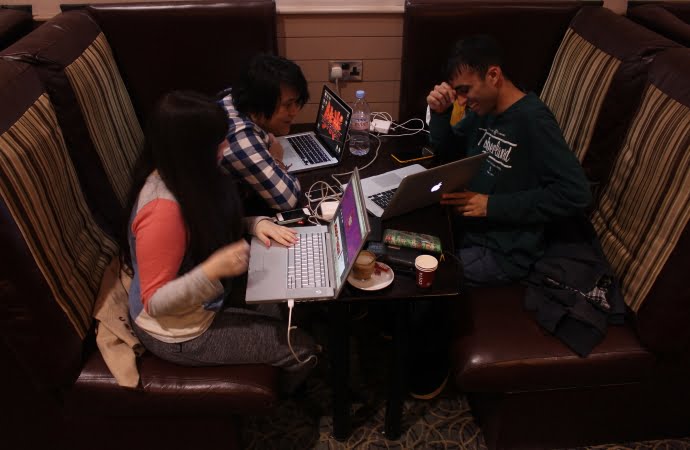“De Mambo is what happens when you make a game for the price of a coffee a day.”
At first glance, The Dangerous Kitchen’s Kickstarter campaign for De Mambo sounds like a television charity appeal. The claims of making a game for ‘the price of a coffee a day’ sounds like a repetition of the classic ‘just £3 a month’ or ‘for less than the price of a cup of coffee’ refrain we hear from charities all the time.
It’s a proven tactic, to put the small amount of money you’re asking for into a relatable daily cost – and ultimately, unnecessary luxury – to guilt people into sponsoring <insert name of needy recipient here>.
With The Dangerous Kitchen, it’s a little different.
They are literally making their game for the price of a coffee because, bereft of a permanent working space, they are building their game out of the lobby of a well-known chain of hotels. That cup of coffee is the agreed upon occupancy fee that they pay to the hotel every day – by way of purchase from their cafe – so that they’re allowed to continue working from their establishment.
We caught up with Shaun Roopra, writer and designer of The Dangerous Kitchen, to hear more about their bizarre working situation and De Mambo, the frankly unusual game it has produced…
Thumbsticks: First up, let’s get the really important stuff out the way: Is The Dangerous Kitchen named after the Zappa song, or did you just think it was an interesting name?
Shaun: We were aware of the song, as Zappa hugely inspires me, but it wasn’t a direct inspiration. The name has a lot—and I truly mean a lot—of reasoning to it, with the song being a real small part of it.
A lot of the stuff we do, especially with naming things, is so spontaneous; it’s really difficult for us to explain! Things just literally happen!
 So how did The Dangerous Kitchen come into being, then? Tell us about the team and how they got together – everybody loves a good origin story!
So how did The Dangerous Kitchen come into being, then? Tell us about the team and how they got together – everybody loves a good origin story!
Well, Amit and myself met at college, in art class no less. We became friends and then eventually partners in crime… Talking about games was something we partook in a lot, from what we like, to what we’d make to me brainwashing him in the Nintendo way etc. so it’s really fun to look back to that time considering that those two lowly art students are actually making a game right now.
We went to Birmingham City University to study animation, met with Lucy and two other good friends and were a really tight-knit group—we probably played Smash Bros more than study!
Someone randomly said, “Hey, we should make our own games company!” to which everyone agreed obviously, as it sounded like a fun dream to have. I’m pretty sure no one truly believed, deep down, that we would actually do it. It was thanks to Lucy that we actually became a business, as she has that active, go-getter mentality that constantly pushes us forward.
After University, we all split up to look for jobs, whilst trying to make The Dangerous Kitchen work. Eventually it got to that point where nothing was happening and everyone felt dejected. Video chatting just wasn’t working for us, so it became apparent that we needed to work together, which was pretty impossible since three of us are in London and the other two are separated up north.
Sadly, everyone realised that only Amit, Lucy and myself were to go forward and dedicate ourselves to making this happen. The other two, Jen and Mark, are still good friends of ours who we hang out with whenever we have the chance, so there’s no bad blood whatsoever.
So with just the three of us, we had to work out where to work. All of our homes have odd complications that prevented us from working there. Our friend mentioned that his sister works at Premier Inn and that we could try the meeting space in the lobby; which we tested out and the rest is history.
We spent a couple of months concepting and creating assets for a game, Yooksin, then realised we need someone to actually code the darn thing. We looked for a coder, but alas, with no money, it was difficult to entice anyone to join us.
Lucy had to go to her old work for a spot of freelance, which was the time in which Amit decided he would learn how to code. This is when things really began to change, and where De Mambo was born.
Working out of a hotel lobby is fairly inexplicable – it’s a little bit rock and roll, but in an incredibly middle-class way – how has that environment worked for the team and its dynamic?
It’s literally perfect for us, I mean, there are a hell of a lot of problems—food issues, trying to obtain a booth, pyramid schemes, loudness when in the restaurant—but it reminds me of the old saying that a lotus flower can grow out of mud.
We had to leave the Inn for a while earlier in the year—we won a place in Playhubs which has helped us immensely, especially with pushing us to meet people and the business side of things which was where we had the least experience; and have only recently returned. It’s so true what they say, that you only miss something once it’s gone!
The Inn just has a certain level of openness whereby anything can happen; it’s not a closed environment. Being near Heathrow Airport, there’s always an influx of different people who pass by, which is great for inspiration. If you’re like me and heavily spontaneous in how you work, the Inn is a creative goldmine.
This is mainly how it’s affected our dynamic, by allowing us to think openly and degrading any values of entitlement as instead of wasting time thinking about what could be, you just have to stay in the present and create.
Personally speaking, doing the obvious and ‘right’ thing has never led me to succeed, so working in a hotel lobby is no big deal!

Are you worried they’ll eventually get sick of your antics and kick you out? What happens then if they do?
Well, we’ve prepared a contingency plan if that were ever to occur which involves hostages and ransoms etc., but it’s probably safer to not talk about this on these public channels…
In all seriousness, we have no clue. We’ve made friends with the staff at Costa, who are seriously awesome. They give us a lot of support so if something were to go down, we’re sure they’ll have our back.
We’re into our second year here, and considering they allow the creepy-crawly antics of a certain, nondescript pyramid scheme to fester, I’m pretty sure we’ll be ok.
Back to the game, then: Where did the idea for De Mambo come from?
As mentioned before, Lucy was at her freelance job, Amit was learning to code and we were all super-mega-ultra hyped for Super Smash Bros 3DS. Amit and I decided that we should celebrate by making a small Smash-inspired game.
I consulted my game-development bible, Iwata Asks, to which I found a section where Masahiro Sakurai described his game making process. He likes to take a genre, take away all of the fluff, leaving the fun core; rebuilding the game from that fun core outwards. So, we decided to take his work ethos and apply it to Sakurai’s own game, which is how De Mambo was born.
Being Amit’s first real coding experience, our technical limitations aligned perfectly with Sakurai’s ethos.
After the prototype was built, we left the Smash influence behind and just kept on adding what was necessary to make De Mambo the best game it could be.
With the Kitchen’s obvious love for Smash Bros. and the Nintendo design ethic, it seems unusual that De Mambo will be initially released for PS4/PS Vita/PC and not Nintendo platforms. Why is that?
That’s simply because of business. Nintendo is our one true love when it comes to playing games, but that’s not wise to take into the business side of things.
Sony’s reputation with Indies is far more valuable than fanboyism. When we were at Playhubs, we got to meet Shahid Ahmad and he tried out De Mambo and gave us some advice, which pretty much shows you Sony’s passion for indie games, considering a Sony bigwig would give three nobodies some of his time.
We’ve exchanged a few emails with Microsoft and Nintendo, so we’ll see how that goes in the future. It’s not like we aren’t interested in them, just that Sony is easier to approach and be approached by. As a small team it’s also difficult to plan for all the consoles at once.
The Wii U does seem like the ideal platform for a party-battle game though; do you have any plans to bring De Mambo to other platforms in future? Perhaps even a mobile version?
If we are successful in our Kickstarter, then of course we will attempt to put De Mambo on all consoles—except the Ouya—even if we are not, we will still try our best to. A kid at the Manchester Day Games Room begged us for a 360 version, so we have to at least try!
A Wii U version would be amazing and would be the perfect dumping ground for a lot our pre-Smash Bros. Wii U discussions, in which we speculated lots of crazy ideas of how to use the Gamepad. Yeah, Nintendo is inevitable for us, so I suppose that’s why we’re not forcing it yet—there’s no point in fulfilling your dreams so early, you have to work for it.
Mobile? Maybe? I mean a mobile De Mambo that is its own thing would be cool, but we’re not the type of people to just try and force it to happen.
What’s been your biggest challenges with creating De Mambo? It’s the team’s first game ever, not just collectively, so it must have been a steep learning curve.
So many challenges, but I think the biggest challenge was before we got to the Inn, the trying-to-make-it-work phase. That was undeniably the hardest part, as we spent years trying to get The Dangerous Kitchen to move, but once it did, thankfully it hasn’t stopped.
Everything after was indeed challenging, yet looking back, so much just fell right into place. Our way of working somehow allows for challenges to dissipate at a moments notice, all it takes is a spark of inspiration, or most likely a shining pearl that hides in the midst of stupid joke.
Yeah, this is our first game, but therein lies the fun as we’ve had so much to learn, it’s honestly the best part. It’s like Orson Welles describing the confidence of ignorance: we’re on the edge of a cliff and too ignorant to know it!
The game looks great in motion but the art style could perhaps be viewed as a little simplistic – particularly for art/animation graduates – was that a conscious decision, or a limitation of the team’s experience?
We are wholeheartedly a gameplay-first company. We are all artists, so if we tried, we could easily make something pretty, but that’s not The Dangerous Kitchen. There are so many people who can create amazing visuals and who aspire to, but not as much who want to innovate in the gameplay department.
We don’t want our art backgrounds to define us; gameplay to us is an art. I mean look at a speed run for any game you like, it’s not the visuals that make it breathtaking, it’s the gameplay.
Gameplay is what drives us, and what excites us. When we started making De Mambo, we were thinking about gameplay and only after it was made, on how it should look. Undoubtedly it’s not the most beautiful game in the world, but it was never meant to be.
Sometimes, I feel graphics can interfere with gameplay. New Super Mario Bros U has an appallingly mediocre art style, but it never interferes with me playing the game. Rayman Origins/Legends on the other hand does, as I’m not looking at what gameplay opportunities I can play around with – I’m looking at how pretty a tree in the background is. Everything in De Mambo was designed for the gameplay.
A good-looking game is a great, but if there’s no gameplay to back it up, then I’m really not interested. In fact I’m actually really disinterested in the visuals of games as of late and feel that music is far more important. Box Boy! is the best game I’ve played this year which kind of says it all really.
If you were starting the project over, is there anything you’d do differently?
Forcing Amit to learn to code earlier! But in all seriousness, I wouldn’t change anything. We’ve been steered faithfully so far by our unwavering ability to just let things happen naturally, that I can’t ever imagine us doing anything different. We’ve had a lot of fun.
De Mambo has been going down well with the general public at gaming expos like EGX Rezzed and Develop: Brighton, and now the team is jetting off to Tokyo for the TGS before returning to the UK for EGX 2015; how have you found the trade show experience?
Simply amazing. EGX Rezzed was deathly tiring in being our first exhibition, but even though we reached a near-death state, we loved every moment. Where else can you meet the nicest of guys who barely utters a word, only to pummel you at your own game?
We’ve had a few bad experiences, with the first person to play De Mambo absolutely hating it—but he was another developer and I’m pretty sure it was because he was too decrepit to grasp the reasoning as to why we’ve done certain things differently.
On the contrary, pretty much every European developer we’ve met at these events has been absolutely amazing and some of the nicest people we’ve met. Radius Vienna actually managed to rid some of the prevailing cynicism I had with people, as the Viennese developers were fantastic.
Has the feedback you’ve been receiving shaped the way De Mambo has progressed?
In all honesty, the feedback we’ve received has been pretty darn positive. Once people learn the rhythm of De mambo, they love it. The only criticism we’ve had has been from people who can’t understand why we’ve done things differently and want us to make the game normal, like say with health bars and having the three attacks on separate buttons. Oh and also some people hate that up is jump, but are usually fine when they actually play it and realize why we chose up for jump—you’re constantly charging with your right hand so having a jump button would interfere with your attacking ability.
Also, there were loads of children—especially at Manchester day—that got the controls instantly, so we kind of trust the kids more than the critics so far!
So, the big question – Kickstarter – how much are you asking for and why should the public back De Mambo?
So we are asking for £15,000 in hopes that we can make De Mambo faster, with more content and of a much better quality.
We have the ambition to make De Mambo rival a classic SNES game, which is a level of quality we may not be able to reach, but regardless we want it to be as timeless as physically possible. There’s no point in making a throwaway game that you play once and then move on to the next throwaway game—there are plenty of people already doing so.
We’re doing this because we love games and so I think people should back us because this is authentic, but mainly because this is probably the stupidest games creation process ever made.
The story of De Mambo and how it was made is pretty fascinating and I think it makes a nice change from Indie Game: The Movie where everyone was depressed or ever so pretentious. We’re having the time of our life and want others to join in, so back us if you want to join in on this stupid, crazy, hilariously fun journey.
When is De Mambo expected to release? Will it be staggered for the various platforms? Will there be any playable demos or early-access, particularly for backers?
Well that all depends on Kickstarter. If we succeed in raising money, then we will work our butts off to get it done for late 2016. If not, we’ll still try and get it done as soon as possible, but it will take longer.
Regarding platforms, there are only three of us and our newly acquired intern, so it would be a difficult task to release on more than one console at a time. If it’s possible to do so, then yep of course we’ll do it, but I also think it depends on the console. If we do a Wii U—or maybe NX by that time—then we would want to have Wii U specific features and thus it will take longer to implement such features. Also, there’s the business side of things to consider too, like when it makes sense to release.
There will be a demo released with our Kickstarter and some new modes being released through our campaign. We’re also running Steam Greenlight at the same time as our Kickstarter.
What happens if De Mambo doesn’t meet its funding target? It’s a sad but potentially very real consequence of Kickstarter.
We will carry on as usual and still make De Mambo—it will just take longer and may not be as fleshed out. We’ve come this far, so there’s no sense of us quitting any time soon.
And finally: What’s next for The Dangerous Kitchen? Do you have any ideas, any more projects lined up?
Well we have the start of Kickstarter to take care of, TGS in Japan, EGX in Birmingham and then the end of Kickstarter, which will keep us super busy.
The game I mentioned we worked on before De Mambo, Yooksin, has a large chunk of its asset base complete, so we have to go back and finish it. We’ll probably have to rework how the game plays since it was designed before we actually made a game, but I think it will be really good and very different to De Mambo.
Other than that, we have a lot of ideas. I have thousands of notes in my phone with game ideas ranging from really silly ideas, to things, which could potentially blossom into something cool.
Hopefully things continue to fall into place and we can become a sustainable company, able to make games for as long as we can, which is the only thing we want really!
The Dangerous Kitchen’s Kicksarter for De Mambo launches today. Why not follow (and back) De Mambo on Kickstarter?









